Hot side hopping experiment
Personally I think there is little doubt that pound for pound (or gram for gram) the best way of getting aroma and flavour in to the final beer is by dry hopping. But this experiment is more for those who for whatever reason don't want to use the dry hopping route, but still want to maximise the hop hit on the hot side.
The aim of the of the experiment is to test which of the most common methods of hotside hopping gives the best effects on the intensity and quality of aroma and flavour.
Methods to be tested:
I choose five different methods, four of which are common methods to most brewers. Plus one that is pretty rare! A no late hop addition. This is there as a control, a potentially low scorer and an interesting reflection of what each method is actually bringing.
1. 5 Minute addition, with stirring during cooling.
2. Flame out addition, with stirring during cooling.
3. Hop tea (hops placed in water at 70C, sealed and held for 3 hours. Allowed to cool.) added at flame out, with stirring during cooling.
4. 80C flame out addition - 15 minute steep at this temperature, with stirring, then cooling also with stirring.
5. No flavour or aroma hop addition.
Recipe:
25L 70% Eff 23 IBUs
5000g Pale Malt
250g Biscuit Malt
50g Munich Malt
20g Carafa Special
50g Cascade hops for 75 minutes
(The beer was designed to be pretty malty, so that if any of the beers were lack lustre in the hopping department I would have a decent beer to drink! Although priority was getting a good hop profile. If I was to redo the experiment, I would go pale malt only.)
Level Teaspoon of Gypsum in Mash and boil
Third of a Teaspoon of Epsom Salts in boil
Experiment late hop additions – 23g Centennial per 5L – 2012 crop was used, all fresh, from the same packet.
Method:
1. Create 25L of wort.
2. 75 minute boil to try and eliminate most flavour/aroma from bittering addition.
3. Run off hot wort off bittering hops to holding bucket.
4. For all methods 5 litres of wort is then added to a pot, heated to boiling for five minutes, then one of the methods detailed below in 5,6,7,8 and 10.
5. Conduct a five minute hop addition. Cool. Settle for five minutes. Filter. FV.
6. Conduct a flame out addition. Cool. Settle for five minutes. Filter. FV.
7. Add a hop tea addition at flame out. Cool. Settle for five minutes. Filter. FV.
8. Cool to a 80C and steep for 20 mins. Cool. Settle for five minutes. Filter. FV.
9. Whilst aroma/flavour hops are in contact with hot wort some form of agitation or stirring will be involved. Every attempt will be made to keep this stirring consistent.
10. No hop addition. Cool. Settle for five minutes. FV.
11. Prepare 1 packet of S05 with 100ml of water. Add 20ml to each FV.
The Wort Store (chiller in there just to keep it fairly sanitary whilst messing about)
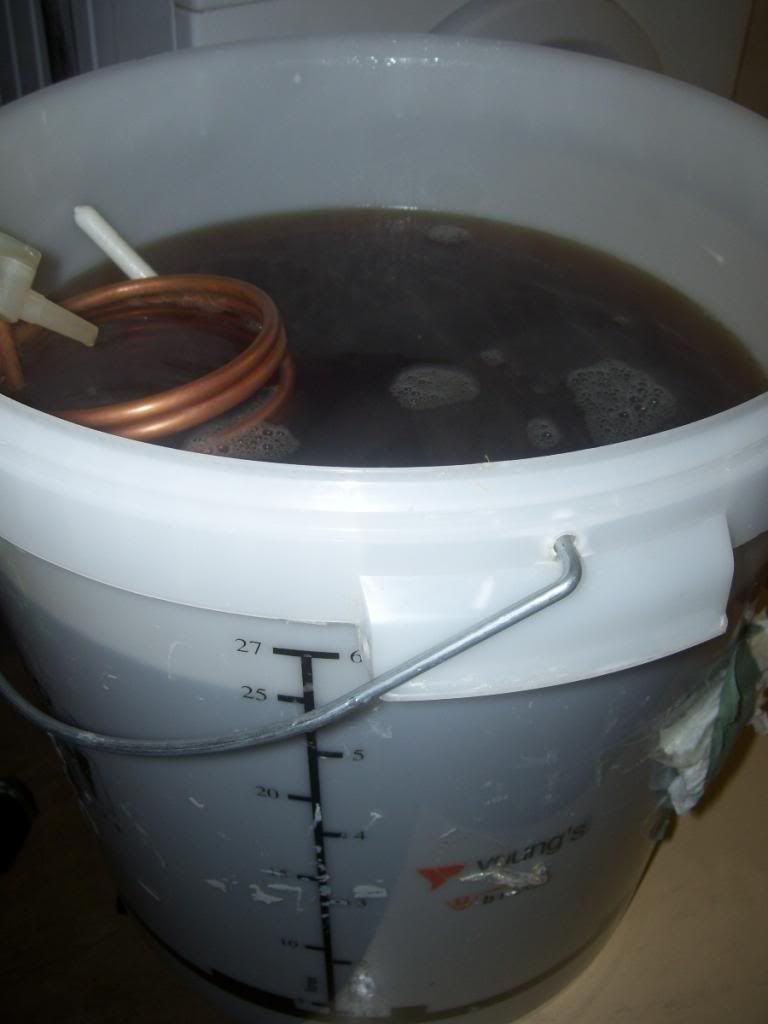
Five litres at a time
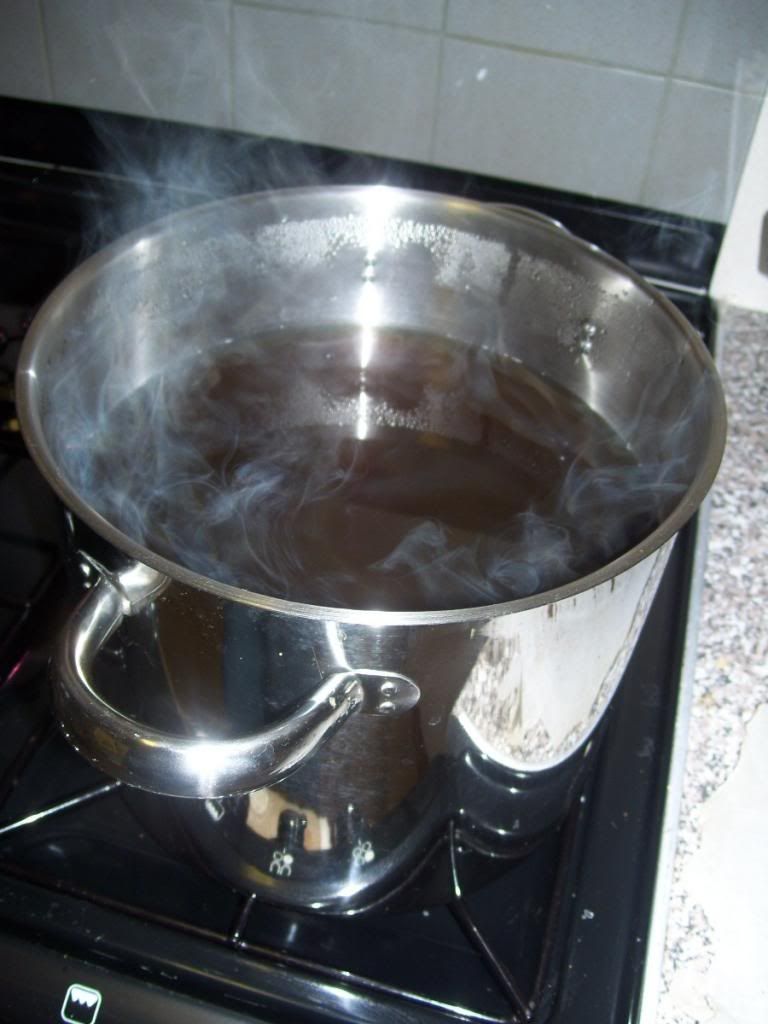
Rapid Cooling
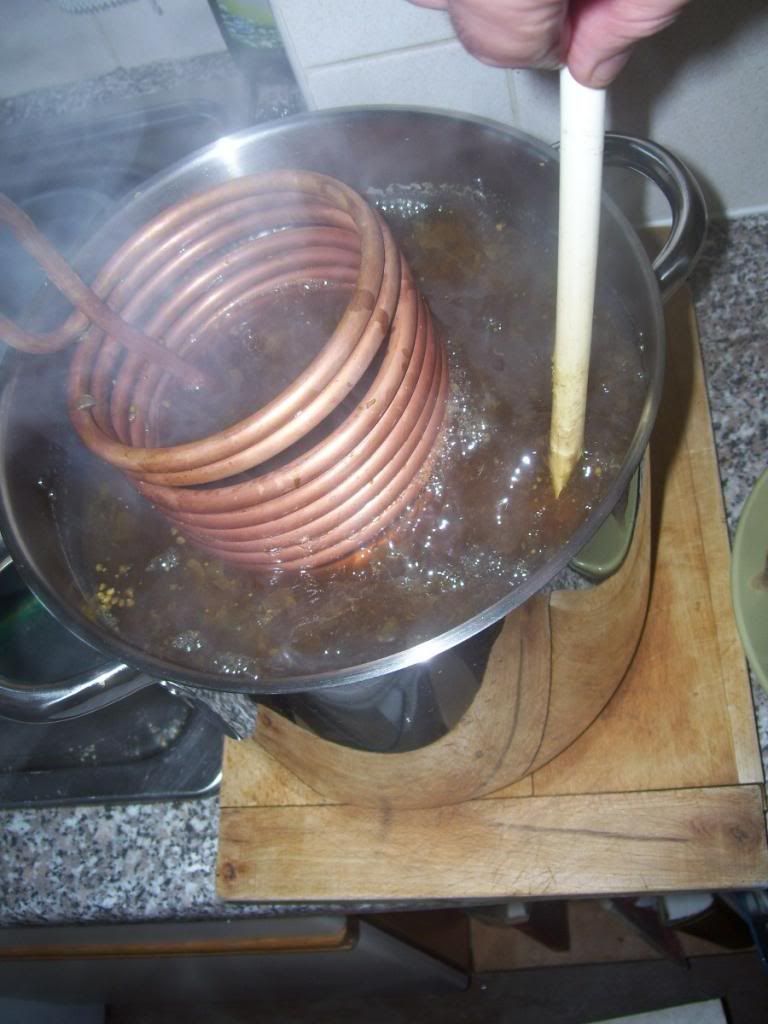
Individual Fermenters
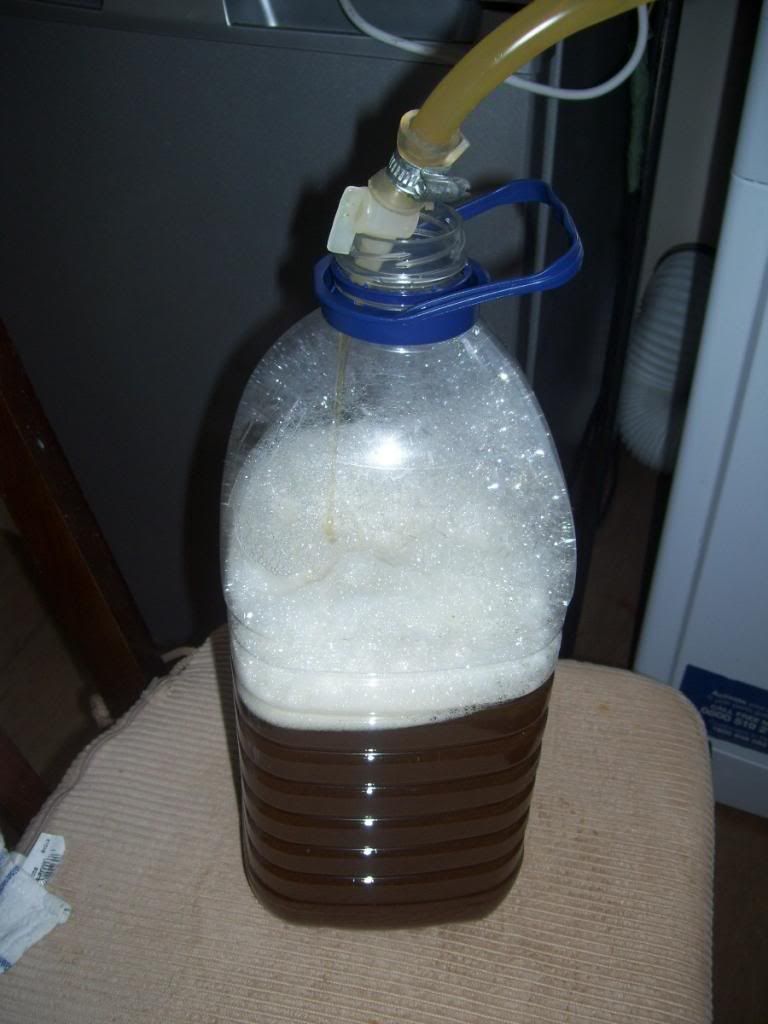
Finished
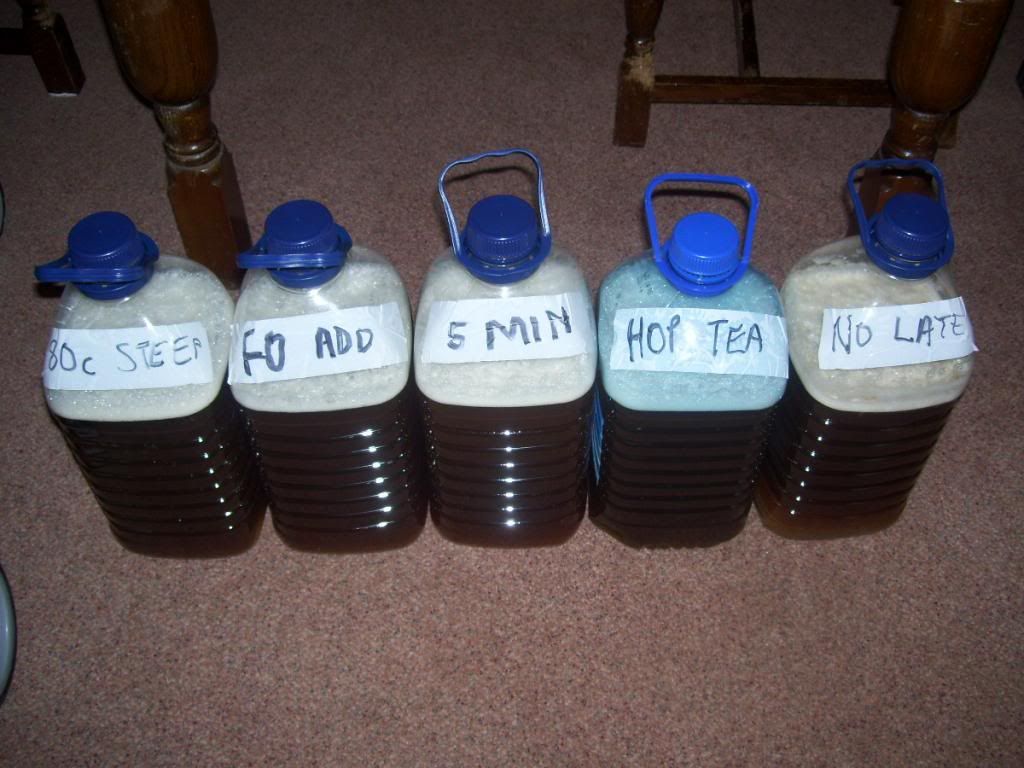
General Observations during brewing:
-The hops post filter still had a lot of aroma - the most intense aroma from each method was found with the flame out addition.
-It was difficult to be completely sanitary with so many moving parts. Also because I was using the family kitchen and not a designated brewing area I may have felt time pressure. Hopefully there won't be any infected batches. (Thankfully there wasn't and wife eventually forgave me)
-The method that left the most oils on the side of the boiling pot was the five minute addition method.
-The brewday was difficult and quite wasteful. A lot of hops smelt as if they were being wasted! I even thought about giving up half way through.
-I don't know why, but the final beer seems to have come out a lot darker than the 17 EBC I initially calculated. The beer was more golden/ruby.
-The worth of hops as a filter is clearly seen as the cold break was allowed through in the No Additions method. The krausen on that one was brown, were as on the others it was white.
-A good hot break occurred on the initial boil. The 50g of Cascade acted as a good filter and the wort came through clear. So to see a cold break form from a clear wort was quite a treat. I never really believed that cold break existed!
-It took 15 minutes to cool each method from above 100c to 20c, ready for transfer to the FV. This has been annotated in to the 'hop contact time' column on the table.
Sampling and Results
The test subjects were given the five different beers, along with scorecards created by myself. I have collated the results, and created the averages and input them to the tables below:
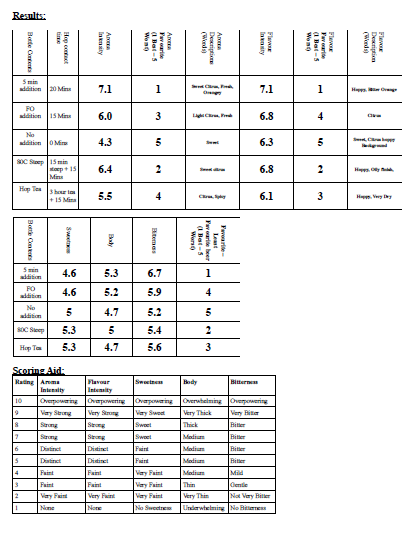
Comments on sampling:
Most judges had all the samples available at the same time making comparison is easier. Although the Shed Brewers of East Anglia had them in a running order. This was unavoidable, due to being in a public house, and the availability of glasses. I thought this may have made their results erratic, but comparing them to the other results, theirs showed little variation.
All scoring/judging was done blind to bottle contents, and the total number of judges has totaled 24 for the above results table! The bottle contents were only revealed once all judging had finished. This meant that comparisons to the 'no late hops' beer could be made.
When words were used in descriptions, I have included those that were mentioned most often.
I also included a column on the score sheets for condition and clarity. They all recorded an average condition and a clear clarity. I decided to drop this from the results above.
All judges were encouraged to give name, date and extra comments about the beers and the experiment.
Conclusions
My conclusions shall be limited to a few paragraphs, as there are so many factors in this experiment, to comment on everything would fill pages. Also I believe that there can be a lot of individual interpretation of the results from the table, as increasing one factor in a beer very often leads to a side effect. Making it impossible to give a ‘this is best’ conclusion.
Aroma:
Aroma was really the driving force of the experiment. The results, for me, were quite unexpected. I like a good firm hop aroma, and I have used all the methods listed above in my brewing history at sometime or another. But I have never carried out a direct comparison before. Always relying on home made score sheets and memories of a past beers to guide me. I more regularly used the Flame Out, Hop Tea and the 80c steep methods for achieving this. Most often out of an impression that they should work better than boil hops. I have always had the assumption that the hot wort (especially a rolling boil) is driving off sensitive aromas.
When I smelt the beers, the difference to me was clear. The five minute addition was the most intense. I found the 80c steep and the flame out aromas to be equal second, although the collated results rebuke this. With the hop tea coming third in intensity. Although, with an aroma not really to my liking.
Flavour:
The results for flavour intensity were less clear in my opinion. But were also a little more predictable.
The only shocker came with still finding Cascade qualities within the no late hop addition beer. I was always led to believe that a long boil will drive most of the flavour and the entire aroma off the beer leaving only malt flavours and bitterness behind. This was definitely not the case. No one spotted that this beer had no late hops in it, unless prompted that one of the beers was such.
I did expect more flavour impact from the hop tea method. But I believe that maybe some process (possibly tannin extraction?) made it taste drier less flavour intense. But then it could be the steeping water contributed to a diluting effect.
Comment on Judging:
I was amazed in the variance of what people tasted and smelt. Not only do peoples opinions on what is 'nice' differ. But also peoples perception of flavour, aroma and even intensity differ too.
I am no expert. But I can only put the difference in perception of intensity down to peoples senses being more sensitive/de-sensitive to certain chemicals. Thankfully the averaging of all results provide the results that were true to the majority.
Although having said that, some results of individuals which didn't stick with the pattern of the average are worth comment. A few judges rated the aroma of 80c steep more intense than the five minute steep. Which to me is really odd, as the difference is striking. But I guess it’s an individual perception thing.
One judge believed that all the beers were the same and I was carrying out an experiment in to the psychology of judging! Whilst another believed that all the beers had different malts, and did not share a common ancestry.
The Future
For me I shall be doing more five minute boils now, rather than prolonged 80c steeps, not only for the increased aroma but also to cut some time out of the brewday. I will take in to account an increased bitterness by reducing the bittering hops at the beginning of the boil.
The next experiment I would like to see is steeping length effects on hop aroma, or a variation in boil time lengths.
Although I will also try another experiment which deals with the effects of changing steeping time and another on differences between 20,15,10 and 5 minutes.

